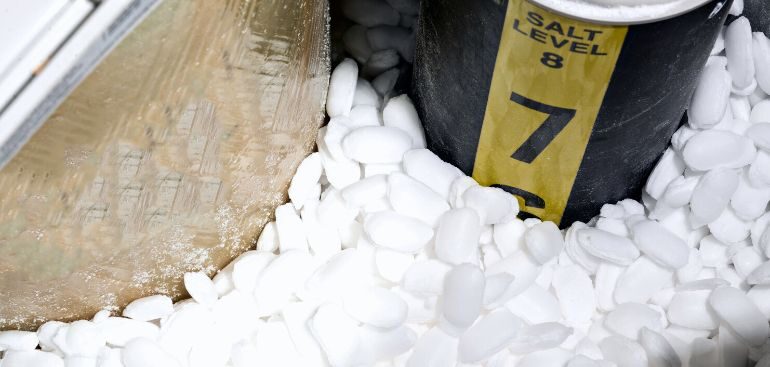Use a water softener to remove hard water minerals that make detergents and soaps less effective, increase wear on your plumbing fixtures, and shorten the life of your water-using appliances. Find the right treatment for your home with this quick guide to the different types of water softeners.
Salt-Based Water Softener
The most common type of water softening system uses salt. The system is comprised of a mineral tank that contains resin beads and a brine tank that holds salt.
Hard water typically contains calcium and magnesium ions. When hard water enters the water softener system, it flows through the resin beads. The resin beads exchange the hard water ions with sodium ions to create softer water.
Salt-Free Water Conditioner
A salt-free water conditioner doesn’t actually soften water, but it prevents harmful mineral buildup. The salt-free system crystallizes calcium and magnesium minerals so they cannot attach to surfaces to form scale buildup inside your plumbing, on clothes, on water fixtures, and in appliances.
Water conditioners use a process called template assisted crystallization (TAC). Water flows through a tank containing polymer beads that have pits. The beads attract magnesium and calcium ions, which fill the pits—also called nucleation sites—on the beads. Microcrystals of magnesium and calcium form, and once a crystal becomes large enough, it detaches from the bead and enters the water.
Salt-free water conditioners work better with moving water, not standing water. To truly soften your water, have a water treatment service provider install a salt-based water softener in your home.
Reverse Osmosis System
A reverse osmosis (RO) system filters unwanted impurities from water, including the calcium and magnesium that cause hard water. An RO water system purifies water by removing many types of contaminants, whereas a salt-based water softener uses a more simplified system to remove minerals through ion exchange.
Depending on your RO system, water can pass through three to five filters during treatment before entering your home. RO systems use a semipermeable membrane through which water can pass but dissolved solutes cannot.
If you want to have soft water but don’t need to filter out other contaminants, a salt-based water softener might be the better option for your home. But if you need to do more than address hard water, an RO system might be right for you.
As this quick guide to the different types of water softeners shows, you have many options for addressing hard water in your home. Find the right treatment for your household with Good Water Company, experienced and reliable water softener service providers licensed in Colorado and New Mexico. Contact us today for your customized filtration system.

